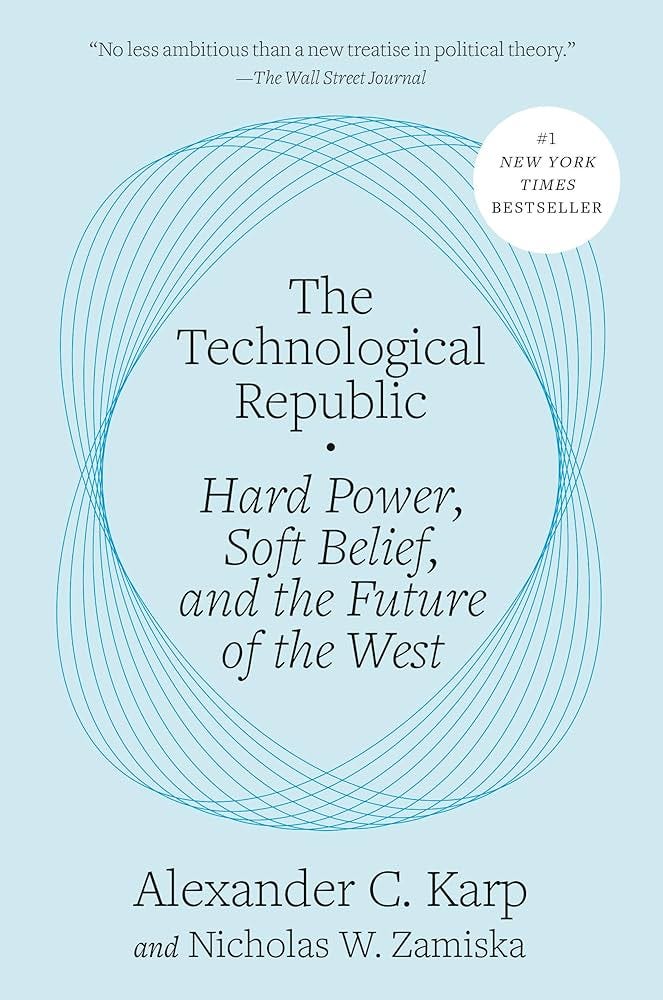[POST] The future of war ...
Looks an awful lot like the future of public safety and policing -- and that's both scary and good
This is a reader-supported publication. I give it all away for free but could really use your support if you want me to keep doing this.
Let me save you the cost and bother if you’re considering reading Alex Karp’s book Technological Republic: it’s not a good book, and disappointingly so. The idea (per the blurb above) that it constitutes a treatise on political theory is laughably off-base. There is nothing close to theory here. The WSJ reviewer had to be high to come to that conclusion, IMO.
Having said that, Karp’s company, Palantir is leading a true revolution in military affairs, with software finally trumping hardware to engineer — finally and truly — network-centric warfare (now called something much cooler, as we will see below). So, you would have thought that, with that ambitious title, this guy was going to reveal something about this future pathway — except he doesn’t reveal much of anything.
Instead, Karp and his ghost writer basically whine on incessantly about how the “radical left” has ruined America, turning us into a bunch of wishy-washy weaklings only interested in stupid consumerism. Americans, we are told, don’t really believe in anything anymore. Things like virtue, character, courage … all of it gone. Silicon Valley is to blame for a lot of this by feeding this consumerism frenzy when it should be working hard for the Pentagon to ensure America’s military supremacy as we shift from the atomic age to the software age.
Is the book a shameless love letter to the Pentagon that had made Karp so rich and his company so valuable? Yes, yes it is. I’m fine with kissing the hand that feeds you, but this book is almost pornographic in its desire to honor its benefactor.
The book is also full of poorly chosen vignettes and character sketches that add up to about 175 pages worth of nothing out of 220 or so total pages of text.
Every once in a while Karp enunciates something interesting, but they’re just blips in the text — toss-offs, really. Instead, we get beat over the head at every chapter’s conclusion with the same single argument: America, Americans, and Silicon Valley have all lost their capacity to pursue grand national projects like developing the A-Bomb in WWII and that loss will doom us in any competition with China or authoritarian states that will invariably outperform us lazy hedonists.
Does the book leave the door open for authoritarianism being a better choice? Yea, it does signal that here and there — to its shame.
The goal of this book is really to be an advert for the company: If only the rest of Silicon Valley would man-up like Palantir and get into the defense/policing business like the firm has so successfully done, then we’d return to our true technological roots as a republic (a past condition as poorly explained or close-to-non-explained as what any future technological republic should look like).
I kept waiting for the chapter that wasn’t just some regurgitation of standard stories about the superior functioning of Silicon Valley and its companies — always tail-ended by the same complaint that all that talent is being wasted on stupid consumerism, but that pay-off chapter that I was hoping for just wasn’t there.
I was actually stunned when I reached the last page and realized it was the last page, as it was almost as if Karp (or his ghost) forgot to write a rudimentary conclusion. It was like the film broke and the movie screen just went white.
To say the least, I was deeply disappointed. Clearly, this book was a triumph of commerce over content, which is sort of ironic given the constant bitching throughout about mindless consumerism. I mean, I paid $35 for a hardcover and didn’t really get a single idea I can use — which is kind of rare because I’m not that picky.
The book’s long list of straw-man arguments was likewise a turn-off: basically, real courage is to think like Karp and Palantir and everything else is vacuous relativism.
Roger that.
Again, too bad, because Palantir is a fascinating company doing a lot of breakthrough work and really is America’s flagship technology firm when it comes to countering China’s global quantum grand strategy (as I call it) of sensoring up the world so it can:
Collect all that big data
Use it to fuel its AI development
Exploit the resulting entire capacity (omniveillance) to exert a soft-totalitarian control over its citizenry
Export those systems abroad to fellow autocrats and right-leaning governments, pulling them into China’s technological empire by way of its Belt and Road projects and Smart/Safe City offerings
Exploit that global capability to preemptively counter any and all threats to Communist Party rule.
Here’s how I put it in America’s New Map:
Advanced authoritarian governments like China increasingly grasp the potential for gamifying their citizens’ daily lives as a virtual means of totalitarian control. Chinese technology companies are required by law to share with the government everything they collect on citizens, enabling security agencies to calculate a “social credit score” that captures any activity or association deemed more or less acceptable by the Communist Party. Have a friend who openly criticizes the government? You lose points. Noticed searching “harmful” ideas online or geo-located at a street protest? You lose points. Conversely, like the right pro-government post? You gain points. Same for ending associations with “antisocial” people.
By design, point totals trigger real-world consequences. You try to buy that train ticket to Province X but are told your rating does not allow such travel. Your attempts to access a more exclusive housing complex are rebuffed without explanation. Meanwhile, you look around and realize that friends who toe the party line increasingly live in an entirely better universe than yours, going to places off-limits to you and engaging in activities beyond your grasp.
Pretty soon you find that you are self-correcting to raise your point total. Frowning in public is captured on face-recognition cameras, so you smile vaguely whenever outside your apartment. You avoid friends with lower scores. You realize that your every movement, act, and even emotion is being held against you, determining the size of your virtual cage. The government no longer needs to actively control you—just remind you of your score. After some time, you are your own police, your own jail-keeper, your own minder. You have been gamified into complete submission within the Matrix.
China peddles that Orwellian vision around the world to frightened governments eager to control their restive middle class and tech-savvy youth. It is also why Beijing vacuums up Big Data on everyone on this planet to predictively identify those who are, or may become, a threat to Communist Party rule—Minority Report on a global scale.
That is what we’re up against, and it is a supremely impressive effort on China’s part — this quantum grand strategy.
America cannot just sit on the sidelines, ceding vast portions of the globe to China’s digital colonization. Seriously, this is another Teddy Roosevelt moment for us (from ANM):
TR’s fears of the “stationary state,” in which Americans’ natural ambitions were boxed in by imperial powers claiming the world’s remaining frontiers, pushed him to declare an “open door” policy toward China, then being devoured by colonizing powers. It was the first time any US president had extended the Monroe Doctrine’s logic of curtailing European imperialism outside the Western Hemisphere.
This time around it’s China that’s closing doors behind itself as it enters into emerging markets and captures them whole in big-data/AI terms.
That’s what I was hoping to find in Karp’s book: not only a clear explanation of what China is doing around the world but some clear vision from him about what America needs to do to counter that grand strategy and — then and only then — tell me how Palantir is the right company for the job (a sales pitch I was primed to accept — thus my disappointment to be wading through page after page about stuff that really has nothing to do with that future challenge).
Understand: Palantir just won a $30m contract to create a tracking system for all migrants:
Federal officials are building a sprawling new database system they're calling "ImmigrationOS" to track and target millions of people living illegally in the United States
A $30 million no-bid contract with GOP megadonor Peter Thiel's Palantir Technologies will help Immigrations and Customs Enforcement agents build a sophisticated system to prioritize people for deportation, including accused gang members and people who have overstayed their tourist visas. The contract with the Denver-based company calls for rolling out a prototype this fall.
Let me be clear here: America needs a system like this, despite its scary connotations, and Palantir is the company to deliver it. It’s only when we achieve the necessary transparency and thus control that we can truly reform our immigration system for the better. Right now it’s just this huge black box of bureaucracy that migrants can game. So, yeah, if you want freer immigration, it’s gotta come with this sort of heightened big-data-driven and AI-fueled surveillance. Expecting otherwise is just naive in this day and age when my car insurance company tracks my every turn and braking.
Does this contract push Palantir ever more into the realm of policing and social control technologies akin to what China is pursuing?
Yes, yes it does, and that’s a good thing — unless you think we should abandon the entire field and planet to China.
FOREIGN POLICY: The Pentagon Fixates on War Over Taiwan; While U.S. military leaders fret about China, Trump has dismissed the Asia-Pacific.
Our national security establishment just can’t wait to play that hand of poker with China over Taiwan, believing, in a supremely reductionist form, that such a “victory” would constitute our “win” over China this century, when it would mean nothing of the sort (and thus my being okay with Trump being — frankly — wisely checked-out on this subject).
My point: We can’t just bitch about what China is doing around the world; we need to outperform them both in the technologies of omniveillance and in their management by regulatory and judicial means. We have to come up with a better, safer, more customer-friendly, more Constitutional version of what China is marketing, and, yeah, it makes sense that we — just like China — apply those technologies first here at home before exporting them to allies and like-minded states who realize they too will need these capabilities going forward and that they’d rather trust the US version than the Chinese version.
Again, per my book, this is the crux of my argument for a “superpower brand war” — really, its prime product and sale and customer-relationship:
Today, America insists on bringing a knife to the gunfight that is the superpower brand war—a game China is winning stone by stone. Oblivious to Beijing’s strategy, Washington frames the contest along familiar lines—namely, the poker-like military showdown over Taiwan. While Washington dutifully marshals its defense budget to prepare for the next generation of high-tech warfare (knife), Beijing calmly executes its Belt and Road Initiative to lock in its stealthy access to local police and security systems worldwide (gunfight). Both imagine a path to supremacy playing different games: America hunkers down while sharpening the pointy end of its military spear, while Beijing methodically maximizes its worldwide political, economic, and security presence, seeding work-arounds for feared disruptions to come.
With globalization becoming increasingly digitalized, ask yourself which strategy seems more appropriate.
Don’t get me wrong: there is plenty to fear and thus watch out for in this ImmigrationOS. In many ways, this reminds me of the Bush Administration’s idea of Total Information Awareness — namely, using the excuse of needing to track a sub-population (terrorists back then, migrants today) to create an Orwellian capability that can then be easily extended to the entire US citizenry.
From Wikipedia:
Total Information Awareness (TIA) was a mass detection program by the United States Information Awareness Office. It operated under this title from February to May 2003 before being renamed Terrorism Information Awareness.
Based on the concept of predictive policing, TIA was meant to correlate detailed information about people in order to anticipate and prevent terrorist incidents before execution. The program modeled specific information sets in the hunt for terrorists around the globe. Admiral John Poindexter called it a "Manhattan Project for counter-terrorism.” According to Senator Ron Wyden, TIA was the "biggest surveillance program in the history of the United States".
Congress defunded the Information Awareness Office in late 2003 after media reports criticized the government for attempting to establish "Total Information Awareness" over all citizens.
Although the program was formally suspended, other government agencies later adopted some of its software with only superficial changes. TIA's core architecture continued development under the code name "Basketball". According to a 2012 New York Times article, TIA's legacy was "quietly thriving" at the National Security Agency (NSA).
That’s the future of domestic policing, and, yeah, it is Minority Report scary.
But it’s also the future of warfare. From Axios:
In a curtained-off alcove of a U.S. Army lab just minutes off Washington's Beltway, reporters glimpsed the near future of war.
It was robotic, electronically saturated and inclusive of all domains, including air littorals dominated by drones.
The big picture: The U.S. Army has for years organized Project Convergence, a weapons-and-networking crucible that welcomes Air Force, Navy and foreign participation in pursuit of the Pentagon's connectivity nirvana, Combined Joint All-Domain Command and Control.
The future of policing and public safety will be very similar — just with less things blowing up.
Old-school thinkers believe we’re in a race with China to rule the future battlefield. We aren’t. The future battlefield is a wasteland and a no-man’s land not worth contesting — much less “winning.” One doesn’t need to prevail in this sort of pointless warfare; one needs only play spoiler and denier.
Instead, we’re actually in a race with China to rule the future policing field — as in, whose system of public safety conquers more of the world?
Palantir is key to that future, as is Anduril and other companies like them.
That’s the vision I was hoping to catch in Karp’s book, and it delivered nothing of the sort.
Since Karp is obviously a smart guy, I will blame it on his ghost, whom he chose unwisely.
With zero modesty, let me say I would have written Karp a much better book — one actually worth NYT-bestselling status.
We are headed to a future in which security reigns supreme and defense takes a back seat. It’s been the other way around for decades in the US, and it is coming to an end — and that is genuine progress, despite how the details of that transformation might disturb you.
Why?
Remember, our pendulum is swinging — quite naturally and with solid logic — away from being THE market maker (DEFENSE) toward being just another market player (SECURITY). We sought a multipolar world and now we face one, which means it’s time for us to change-out our global persona.
Trump is a legit avatar of that future — as always, with the right instincts but also with the most inappropriate and extreme of tactics.
Can I call that future an America-First vision? On security, yes, with — again — defense and global order taking a back seat.
We just still await the Great Balancer between these two instincts, these two roles, these two global personae.
And that person could be Rubio. Definitely not Vance.
Maybe Newsom. Perhaps Pritzker.
A citizen can dream, can’t they? Or is that already a pre-crime?
[Tom listens intently for the buzzing of hovercrafts and cops rappelling down ropes onto his back deck.]











